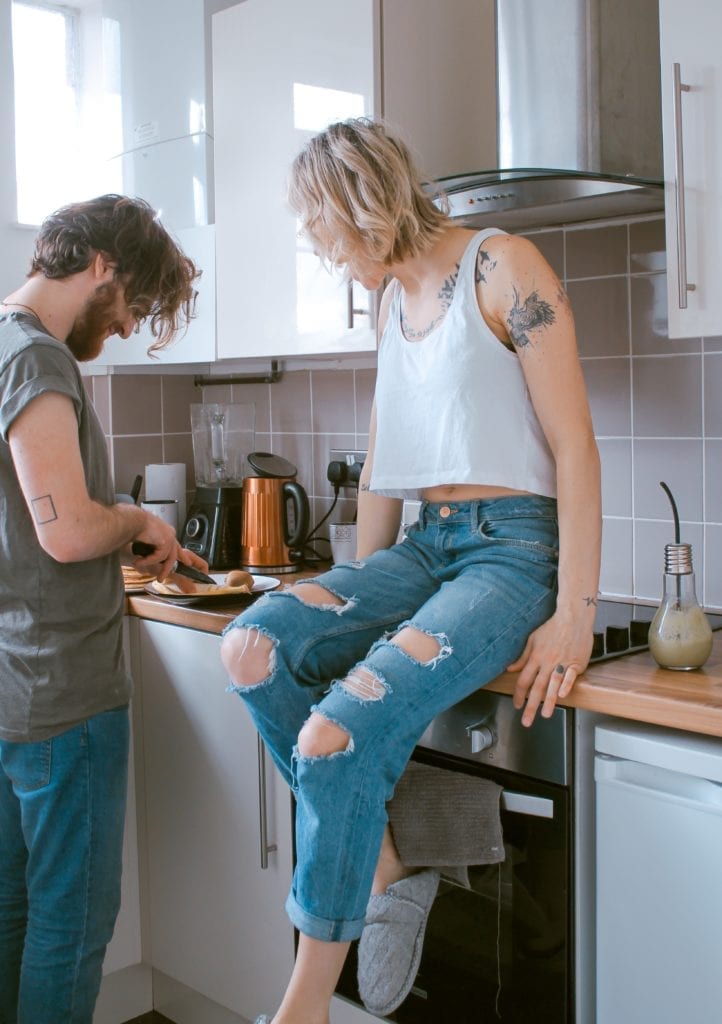Last updated: Aug 21, 2020
As of today (6 May 2020), the 2019 Novel Coronavirus officially COVID-19, is affecting all of us worldwide. It has infected more than 22,922,330 people – and growing – and claimed already in excess of 798,182 lives, making the World Health Organization (WHO) declare the COVID-19 outbreak as a global pandemic, on 11 March 2020.
Countries have responded to this by closing down schools, shutting businesses, cancelling public gatherings, closing the borders and enforcing lockdowns as extreme measures to stop or slow down the virus from spreading further.
China and Italy were between the first ones to descend into lockdown, but other countries are following suit and fast. In difficult times like this, it’s hard not to feel panicked or anxious and equally hard to keep positive. Similarly, it can feel overwhelming to be housebound, work from home and home-school your children.
The social impact of COVID-19 has been tremendous, creating panic and irrational behaviours all over the world. In some cases, such behaviours are more dangerous than the virus itself. Here some advice on how to manage the COVID-19 pandemic situation: from managing anxiety to looking after mental well-being if you have to self-isolate.
First: Be safe!

Be coronavirus ready and safe! The World Health Organization (WHO) is giving advice on how to protect ourselves and others with three simple steps:
Step 1 – Be safe from coronavirus infection
Step 2 – Be smart and inform yourself about it
Step 3 – Be kind and support one another
Click here to learn more about COVID-19 and share with your loved ones.
Managing Coronavirus Anxiety

Practice good anxiety management as much as good hygiene!
Uncertain times can be a breeding ground for anxiety. What’s more these feelings can be fuelled further by misinformation. It’s normal to look for things we can control and seek stability by being as informed as we can on the matter, however, this can lead to feeling overwhelmed by it all and exposed to inaccurate news.
Things to remember and practice:
- Don’t shame – don’t catastrophize
Don’t shame yourself for how you feel. Recognising and acknowledging this rather than trying to hide it can reduce stress. But catch yourself catastrophizing by reminding yourself of the stats.
We tend to fill uncertainty with unhelpful certainty, often of the worst-case variety! Recognize that the chances of the worst-case scenario happening are extremely small, and that actually most people manage better than they think when things are difficult. Notice these and counteract them with evidence-based facts from reliable sources of information. For latest numerical data on COVID-19 check Worldometers. Let your feelings and behaviour be driven by fact rather than driven by fear.
- Limit information intake and ensure you rely on good fact-based sources of info.
Checking news or social media can seem reassuring because it gives short term relief, but longer term it can increase anxiety. Digest news through the day but never check before bedtime!
Managing self-isolation

Rather than fuelling a sense of dread for being housebound, take a moment to reflect on the benefit of not having to commute and take advantage of the fact that, as more people are at home with time in their hands, they too will be more available for a catch up over the phone. Personally, as I had to self-isolate due to COVID-19 symptoms, I found I caught up with friends and family via phone and Skype much more than pre COVID-19. Use this time in your favour: Skype your loved ones! Likewise, seek to make your days at home memorable. Cook nice meals, light candles, watch movies, cosy up reading a book under the blanket and play with your kids! Yes, it is a terrible time and for many it will mean losses, but you can try and make the best of the time you have in your hands by spending quality time with your family and catching up on you-time.
Here’s some tips:
- Keep in contact with friends and family, especially the ones who make you feel good.
Use this time to cultivate your relationships by catching up over the phone or via Skype with loved ones you haven’t spoken to in a while. It’s as much a benefit to you as it is to them. Also, talking and sharing our feelings can help us figuring things out, reduce stress levels and make us feel less lonely.
- Talk though your anxieties with someone sensible you trust but ensure that you allow time to talk about other things too.
It is not healthy to keep focusing on what is making us anxious and it is important to realize there’s other things too. If a conversation with other people is making you feel anxious, don’t feel bad for asking to talk about something else. A simple and polite “I’m really sorry but I find talking about this doesn’t help me right now” can help you gain control over it.
- Don’t forget the basics: eat healthy, hydrate often, move daily, sleep lots.
Washing our hands regularly and keeping social distancing is paramount but let’s not forget the importance of fortifying our immune system too by eating a more varied diet with lots of high-fibre foods! Being vegetarian isn’t a prerequisite for good health, but the more plant foods you consume, the better. Click here to read more on Food and Nutrition for the Prevention and Treatment of Diseases.
Evidence shows that being physically active through regular exercise helps preventing or managing a variety of health problems and concerns, such as high blood pressure, stroke, type 2 diabetes, many types of cancer as well as depression and anxiety. Click here to read on how the body responds to physical exercise. There’s a lot of exercises you can at home and there are plenty free workouts online. Click here to get some ideas for indoor activities.
- Keep a routine as much as possible and continue to do things that create positive feelings including joy and relaxation.
Stay as regular as possible to try not to disrupt your sleep pattern too much. Make sure to schedule breaks if you are working from home and have a list of activities you can do that help you feel good: engaging in things that ‘spark joy’ help to fill the space that anxiety can otherwise try to occupy. According to Meik Wiking, we are the architects of our own memories. It’s important to deposit good memories in our memory bank in order to make withdrawals of happiness. Even during lockdown, you can create happy and memorable memories. Click here for the full article on The Importance of Making Happy Memories.
- Continue to get as much fresh air and daylight as possible
Even if that’s sitting next to a window, get your daily amount of light and Vitamin D!
- Don’t be afraid to ask for help. People love helping as it makes them feel good too.
When the advice to stay home was communicated out by our president in the U.K., my community grew even closer. A WhatsApp group was created by the residents to help people in our street who may need help: from pickups or deliveries to walking the dog. Yes, it is important to keep safe and maintain social distancing, but you can still be kind and safe. It is in difficult and uncertain situations like this, that a communal sentiment can flourish into beautiful solidarity. Click here to watch the Italian as they sing in unison from their balconies to lift the morale and show solidarity.
- Don’t forget the Wide World Web out there!
In times like these even business get creative. The world is literally at your fingertips! If you are at all stuck for ideas on how to entertain yourself then here’s some ideas.
- Sign in for a free 1-month Netflix subscription to stream movies. Get the popcorn ready!
- Take a virtual tour of many museums around the world from the comfort of your sofa
- Explore the many free online courses with the Open University. There’s something for everyone as well as short to long courses.
Fun Fact:
In 1965, Isaac Newton had to work from home when the University of Cambridge temporarily closed due to the Bubonic plague. It was one of the most productive periods of his life and he used that time to develop his theories on calculus, optics and gravity.
How to survive as a couple thought the coronavirus

Whether you are self-isolating or not, is especially important during challenging times like this, to keep each other’s feelings in mind, by sharing how you think and feel about the situation.
Here some tips to keep in mind:
- Try to listen and be there
You may not be able to fix the issue at hand but you can create a feeling of safeness.
- Take the perspective of your partner with empathy.
Your partner may feel differently to you but this does not mean it’s wrong. Ask your partner what worries them most and try to validate how it is understandable.
- Take turns managing the home, kids and other responsibilities to avoid resentment.
Try to refrain from criticising each other’s parenting, do what you can to co-parent as a team. Remember it is about connection, not perfection and you can turn towards each other as a team.
- Even though you may be working from home or in self-isolation, remember to spend quality time together.
Spending time in the same room is not the same as spending quality time together. Plan fun things too: from board games to cooking. Be creative!
- Take the pressure off other things in your life, just get thought this.
Discuss your financial situation and if you need to cut back on things.

Children can perceive our fears and become affected by the way we respond and deal with a situation, so it’s important we know how to better manage it.
- It is likely your child already knows all about Coronavirus, so don’t avoid talking about it.
Give age appropriate information and encourage them to ask questions. Remember, it’s OK to say ‘I don’t know but am here to help you’ to reassure them that all is going to be fine. However, try not to talk in depth about your own anxieties in front of children. Check out @mondheart.kids for a brilliant resource to share with your children.
- Make good memories
Yes, it’s a terribly difficult and sad time but it’s important to keep positive and mentally healthy. As you spend more time indoor think of how to make it fun. Boardgames, reading stories, painting and even making up games. I recently came across a video of a family who cut out large shapes from paper, coloured them in and blue tacked them on a wall. Out of this came a game whereby a person had to “tag the correct shape and colour” as another called them. They seemed to be having an endless amount of fun!
- It is important to support one another however we can.
It is going to be particularly hard for families with older relatives, those who are at risk, as well as other families who depend on services. This is a perfect opportunity to help those in our communities who ned our support. It is likely your block of flats of neighbourhood has people in need or elderly. Be kind and make yourself useful while keeping safe and maintaining social distancing.
How To Be Productive When Working From Home

With more travel restriction being imposed by the governments, millions of people are faced with finding ways of working from home. While for some this could mean working from the comfort of their homes with no commuting and after-school childcare, for others this could mean being faced with distractions and lack of communication with colleagues.
Here some tips on how to stay productive and on top of your workload while maintaining the work-life balance.
– Establish a dedicated workspace
Allocating a dedicated area for you to work could help you concentrate and get in the work mind set. Try not to use your bedroom as that is for relaxing and sleeping. Use instead a spare room, kitchen table or an inspiring corner of your home, but choose a place where you can work undisturbed and undistracted. Even if you have to pack it up each evening, few things help focus the working mind better than a dedicated workspace.
– Stick to your routine but enjoy the extra bonuses
Although some believe that by starting the day as you would otherwise and that by putting your work clothes on will help your mental state shift into work mode, at W&P we respectfully disagree. Enjoy the extra time in bed from not having to commute. Although we don’t think formal clothes is the key to being productive at home, we however think it’s important to get ready for the day by showering and getting dressed, but relish being in the comfort of your own home such as the freedom of wearing a snuggly jumper or feeling the sun on your skin as you work from your garden table. Also, turn your home into an idyllic work environment, for example make yourself nice cup of teas and healthy snacks and don’t forget to take regular breaks, even if it’s just to jump up and down and stretch your legs.
A growing body of research suggests that remote employees, including home workers, are more effective in their day-to-day roles than office-based staff. Could this be because you can just get on with your job instead of being asked for this or that by your boss and colleagues?
– Be flexible but don’t burnout
If you are not used to working from home, you may find that your working day is a little different from what you’re used. This is especially true if you have a family at home and looking after the kids following school closures. Be flexible with your working hours: you may not be able to work your usual 9-5 routine, but make sure you set a clear demarcation between work and leisure hours as your colleagues need to know when you are not available. However, do not work late into the night! Just because you work from home, it does not mean you should be expected to work all hours. Maintain a work-life balance to avoid burnout.
– Stay connected
Keep in regular touch with your colleagues and schedule online meetings to catch up on things. Staying connected can also aid feelings of loneliness, anxiety and stress.
– Entertain your kids
With many kids staying home as school and childcare facilities are closing down, you may find working from home with the kids may be a little challenging. Allocate playing times during the day to carry out creative and stimulating craft games with your kids, and take advantage of audiobooks, educational cartoons and documentaries to get on with your job with as little as possible interruptions.
Just remember…
As you practice social distancing as the new form of solidarity to prevent the virus from spreading, keep close to your mind and heart the famous Italian motto as they keep on fighting this terrible virus: “andra’ tutto bene”. All will be fine.



